小学的英语的课堂师生对话
师生之间的对话作文英语

师生之间的对话作文英语Title: Dialogue Between Teacher and Student。
Teacher: Good morning, class. Today, we're going to discuss the importance of environmental conservation. Can anyone share their thoughts on this topic?Student: Good morning, Mrs. Smith. I believe environmental conservation is crucial because it ensuresthe sustainability of our planet for future generations. By protecting ecosystems and reducing pollution, we can preserve biodiversity and mitigate the impacts of climate change.Teacher: Excellent point. How do you think individuals can contribute to environmental conservation in their daily lives?Student: There are many ways individuals can make a difference. Simple actions like reducing energy consumption,recycling, and using public transportation can all have a positive impact. Additionally, supporting environmentally friendly businesses and advocating for policies that promote sustainability are important steps we can take.Teacher: I couldn't agree more. It's inspiring to see young people like you so passionate about protecting our environment. Now, let's move on to our next topic: the importance of literature in shaping society. What are your thoughts on this?Student: Literature plays a significant role in shaping society by reflecting its values, beliefs, and cultural norms. Through literature, we can gain insight into different perspectives and experiences, fostering empathy and understanding among people from diverse backgrounds. Moreover, literature has the power to inspire change and challenge the status quo, driving social progress.Teacher: Well said. Can you provide an example of a piece of literature that has had a profound impact on you personally?Student: One book that has deeply resonated with me is "To Kill a Mockingbird" by Harper Lee. Through the character of Atticus Finch, the novel explores themes of justice, empathy, and moral courage. Reading this book helped me recognize the importance of standing up for what is right, even in the face of adversity.Teacher: "To Kill a Mockingbird" is indeed a powerful novel that continues to resonate with readers of all ages. Thank you for sharing your thoughts. Before we conclude, does anyone have any questions or comments they'd like to add?Student: Mrs. Smith, I have a question. How do you think we can encourage more people to engage with literature, especially younger generations who are often more drawn to technology and digital media?Teacher: That's a great question. One approach is to make literature more accessible and relevant to contemporary issues and interests. Incorporating diversevoices and perspectives into the curriculum can also help students see themselves reflected in the literature they study. Additionally, leveraging technology to enhance the reading experience, such as through interactive e-books or online discussion platforms, can make literature more engaging for digital natives.Student: Thank you, Mrs. Smith. I appreciate your insights.Teacher: You're welcome, and thank you all for your participation today. Remember, dialogue and open exchange of ideas are essential for learning and growth. Have a wonderful day, everyone.(Student nods and smiles as the class concludes.)。
一年级自我介绍英文问答对话
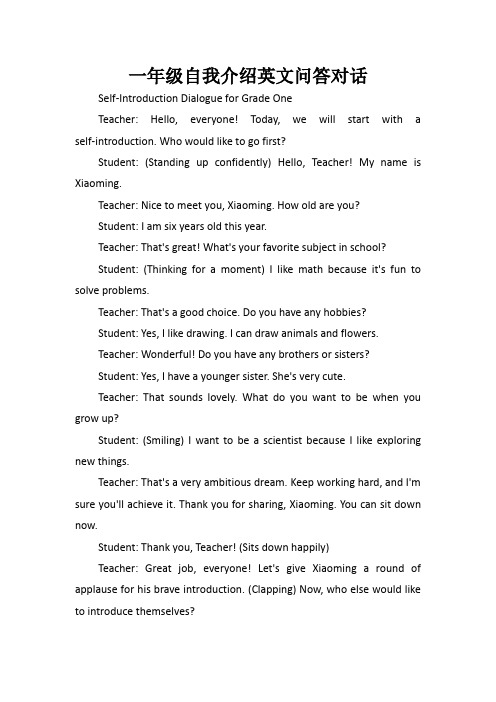
一年级自我介绍英文问答对话Self-Introduction Dialogue for Grade OneTeacher: Hello, everyone! Today, we will start with a self-introduction. Who would like to go first?Student: (Standing up confidently) Hello, Teacher! My name is Xiaoming.Teacher: Nice to meet you, Xiaoming. How old are you?Student: I am six years old this year.Teacher: That's great! What's your favorite subject in school?Student: (Thinking for a moment) I like math because it's fun to solve problems.Teacher: That's a good choice. Do you have any hobbies?Student: Yes, I like drawing. I can draw animals and flowers.Teacher: Wonderful! Do you have any brothers or sisters?Student: Yes, I have a younger sister. She's very cute.Teacher: That sounds lovely. What do you want to be when you grow up?Student: (Smiling) I want to be a scientist because I like exploring new things.Teacher: That's a very ambitious dream. Keep working hard, and I'm sure you'll achieve it. Thank you for sharing, Xiaoming. You can sit down now.Student: Thank you, Teacher! (Sits down happily)Teacher: Great job, everyone! Let's give Xiaoming a round of applause for his brave introduction. (Clapping) Now, who else would like to introduce themselves?。
在对话中,发展思维品质——核心素养下的小学英语师生对话教学
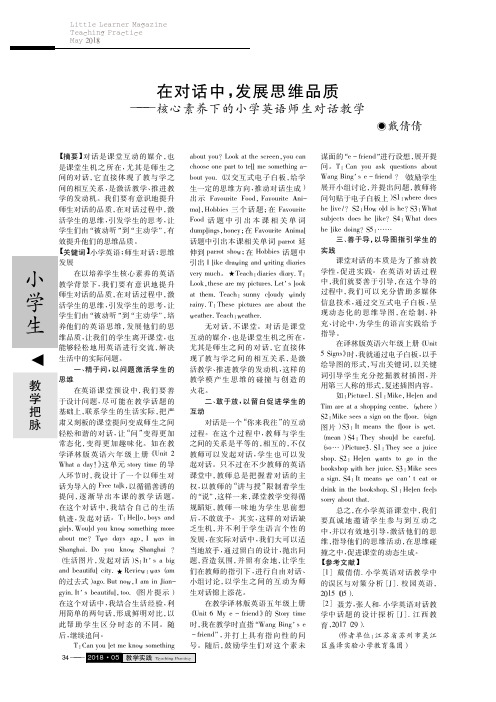
Little Learner Magazine Teaching Practice May 2018———2018·05教学实践Teaching Practice 小学生 教学把脉在对话中,发展思维品质———核心素养下的小学英语师生对话教学?戴倩倩【摘要】对话是课堂互动的媒介,也是课堂生机之所在,尤其是师生之间的对话,它直接体现了教与学之间的相互关系,是激活教学、推进教学的发动机。
我们要有意识地提升师生对话的品质,在对话过程中,激活学生的思维,引发学生的思考,让学生们由“被动听”到“主动学”,有效提升他们的思维品质。
【关键词】小学英语;师生对话;思维发展在以培养学生核心素养的英语教学背景下,我们要有意识地提升师生对话的品质,在对话过程中,激活学生的思维,引发学生的思考,让学生们由“被动听”到“主动学”,培养他们的英语思维,发展他们的思维品质,让我们的学生离开课堂,也能够轻松地用英语进行交流,解决生活中的实际问题。
一、精于问,以问题激活学生的思维在英语课堂预设中,我们要善于设计问题,尽可能在教学话题的基础上,联系学生的生活实际,把严肃又刻板的课堂提问变成师生之间轻松和谐的对话,让“问”变得更加常态化,变得更加趣味化。
如在教学译林版英语六年级上册《Unit 2What a day !》这单元story time 的导入环节时,我设计了一个以师生对话为导入的Free talk ,以循循善诱的提问,逐渐导出本课的教学话题。
在这个对话中,我结合自己的生活轨迹,发起对话。
T :Hello ,boys and girls.Would you know something more about me ?Two days ago ,I was in Shanghai.Do you know Shanghai ?(生活图片,发起对话)S :It ’s a big and beautiful city.★Review :was (am 的过去式)ago.But now ,I am in Jian-gyin.It ’s beautiful ,too.(图片提示)在这个对话中,我结合生活经验,利用简单的两句话,形成鲜明对比,以此帮助学生区分时态的不同。
小学英语课堂师生对话

小学英语课堂中如何实施对话教学柳树中心校:胡洁随着新课程教学的深入,小学英语教学中的一些问题渐渐暴露出来。
比如,有的学生跟不上英语教学的进度,学习英语非常吃力,一部分学生甚至丧失了进一步学习英语的兴趣和愿望;而小学英语教师也感到很困惑:教师教得这么累,学生学得这么苦,为什么效果却不尽如人意呢?针对上述种种现状,探求小学教师英语课堂教学效率,提高小学英语课堂教学的有效性,就显得非常迫切。
如何才能让英语课堂教学更加有效呢?首先要明确小学英语教学的宗旨,即激发学生学习英语的兴趣,培养他们英语学习的积极态度,使他们建立初步的学习英语的自信心,培养一定的语感和良好的语音、语调基础,使他们形成初步用英语进行简单日常交流的能力,为进一步学习打下基础。
由此,我们知道学习英语只要达到能够交流的目的,课堂教学的实效性也就体现出来了。
因此,本文围绕英语课堂中的对话教学带来实效性课堂作出了一些探究。
英语是一门实践性很强的工具学科,运用英语进行交际是其实践性的主要表现。
在小学英语教学中开展对话教学就为学生提供了充分运用英语口语进行交往实践的机会,使学生从中加深理解,熟悉运用,牢固掌握,达到学以致用的目的。
“对话教学”是师生基于相互尊重、信任和平等的立场,通过对话式的相互作用来达到学生自主和自由发展的教学方式。
在“对话教学”中教师通过开放式的问题、情境活动,要求学生联系自己的经验和想法或预习时收集的信息,进行多种形式的交流,从而开发学生的“原始资源”,实现师生交往过程中的资源生成。
教师不是单纯的提供知识,而是与学生共同进行有关学习主题、意见、思想、情感的交流和分享。
总之,“对话教学”既有利于学生主体的凸现,又有利于新型师生关系的培育。
这里结合平时的教学和精彩课堂片断来谈谈小学英语课堂中是如何实施对话教学以带来实效性课堂的。
一、构建新型的师生关系,创设和谐的英语课堂氛围,以提高课堂教学效率。
传统教学中,教师是知识的载体,高大威严的形象使得众多学生敬而远之,甚至于关系紧张,学生在压抑,被迫的情况下进行学习,学得无奈,课堂教学效果也是可想而知的。
小 学 英 语 课 堂 实 录(六上Unit3My weekend plan)

小学英语课堂实录山西省大同市云冈区新胜第一小学英语闫云芳PEP 六(上)Unit 3 《My weekend plan 》Part (A) "Let's talk"一、Greeting for beginning class :1、师生口语问候T : Class begins . Good morning boys and girls .Ss : Good morning Miss Yan .T : First , I want to ask you some questions . OK ?Ss : OK .T : Listen to me carefully . Start now .2、师生互问互答(同时教师适时加分鼓励和评价)(1)What do you usually do on the weekend ?(2)What's your hobby ?(3)What are your hobbies ?(4)Do you like English ?(5)Do you like swimming ?(6)Can you wash the clothes ?(7)Which season do you like best ?(8)Why do you like best ?(9)What's your favourite food ?(10)What's your favourite season ?(11)Why ?(12)What's your favourite animal ?(13)What's your favourite day ?(14)What's your favourite clothes ?(15)How many seasons are there in a year ?(16)What are they ?(17) How many days are there in a week ?(18) What are they ?(19) How many months are there in a year ?(20) What are they ?(21)What did you do last weekend ?(22)What do you often do on the weekend ?(21)What are you going to do next weekend ?二、Let's do some veview :(复习表示将来的时间状语):This morning ,this afternoon ,this evening ,tonight ,tomorrow ,next week .Today ,the day after tomorrow ,tomorrow morning ,tomorrow afternoon ,tomorrow evening ,next Monday ,next Sunday ,next weekend ,next month ,next year, the next day ….三、Let's practice :1、教师介绍本课句型结构:(1)主语+will+动词原形(2)主语+be going to+动词原形(3)主语+be going to+the+名词+表将来的时间状语2、教师出示本课例句及九个短语,并让学生完成造句——教师给予适当鼓励和评价例句1:I will go to the supermarket tomorrow .例句2:I am going to the supermarket tomorrow .例句3:He will visit his grandparents next weekend .例句4:He is going to visit his grandparents next weekend .例句5:We will take a trip next year .例句6:We are going to take a trip next year .&九个短语:See a film、Watch TV、Clean the room、Do homework 、Wash the clothes、Go to the park、Do housework、Cook dinner 、Do the dishes (造句环节的课堂气氛活跃,学生的积极性很高)四、Let's talk :1、教师播放课件录音,让学生用笔在书中画出自己不懂的地方2、学生在组内完成一问一答(一生提问题,另一生回答问题)3、教师播放对话中的相关动画课件内容4、教师再次播放对话录音,要求学生边听边进行跟读5、教师让学生全班分男、女生两大组进行分角色朗读课文对话T: Who will be Sarah ? Who will be Mike ?Ss : The girls will be Sarah , the boys will be Mike .五、Discuss some questions in groups : (小组讨论—教师所提问题)1. What is Sarah going to do tomorrow ?2. What is Sarah going to do in her lesson ?3. What is Mike going to do tomorrow .4. It sounds(sound /sounds) great !5. I have to(不得不)do my homework now .六、Let's wrap-up :(教师引导学生共同完成——本课语法总结)1. 不定冠词“a”与“an”的用法。
可爱的老师对话英文作文

可爱的老师对话英文作文英文回答:Hello, my dear students! Welcome to our English lesson today. I'm so excited to be here with you all.First of all, I'd like to take a moment to remind you all that you are all capable of achieving anything you set your minds to. You are a bright and talented group of students, and I have no doubt that you can accomplish great things.Now, let's get started with today's lesson. We're going to be talking about the importance of learning English.As you know, English is the most widely spoken language in the world. It is the language of business, education, and international communication. If you want to succeed in today's globalized world, it is essential that you have a strong command of English.There are many benefits to learning English. For one,it can open up new opportunities for you in your career. If you know English, you will be able to communicate with people from all over the world. This can be a huge advantage in today's job market.In addition, learning English can help you to better understand other cultures. When you learn a new language, you also learn about the culture of the people who speak it. This can help you to become more open-minded and tolerantof other ways of life.Finally, learning English can be a fun and rewarding experience. It is a challenging language to learn, but itis also a very rewarding one. When you finally master English, you will have a sense of accomplishment that youwill never forget.So, if you're thinking about learning English, I encourage you to do so. It is a valuable skill that will benefit you in many ways.Now, let's open our textbooks to page 10. We're goingto start with a reading comprehension exercise.中文回答:亲爱的同学们,欢迎来到今天的英语课。
小学1-6年级英语常用情景对话汇总

小学1-6年级『英语常用情景对话汇总』一、日常问候和答语1、Hello/Hi你好。
2、Good morning/afternoon/evening早上/下午/晚上好。
3、How are you(this morning/afternoon/evening)?你今天早晨/下午/晚上好吗?4、Fine, thank you/thanks我很好,谢谢。
5、Not bad, thank you 不错,谢谢。
6、How do you do?你好。
7、Nice to meet/see you. 很高兴认识/见到你。
二、告别、祝福和答语1、Goodbye/Bye再见2、See you! (See you later!)再见,回头见。
3、Good night晚安。
4、Happy birthday!生日快乐!5、Thank you!谢谢!6、Happy New Y ear!新年快乐!7、Happy New Y ear!/The same to you!(大家共同的节日) 新年快乐!/也祝你新年快乐!8、Happy Children’s Day!儿童节快乐!9、Happy Women’s Day!妇女节快乐10、Merry Christmas!圣诞快乐!三、介绍和谈论人物1、My name is.../ I’m... 我的名字是.../ 我名叫...2、This is Miss/ Mr/ Mrs...这位是...小姐/先生/女士3、This is my friend这是我的朋友4、He/ She is ...他是/她是...四、询问1、What’s your name, please?你的名字是什么?2、What’s his/her/its name?他/她/它的名字是什么?1、How old are you?你多大了?2、How old is he/she/it?他/她/它多大?1、When is your /his/her birthday?你/他/她的生日是哪一天?1、Where is/are ....from? ....从哪里来?2、Where do/does... come from? ....来自哪里?1、Who is he ?他是谁?1、What is he?他是什么职业?2、What does he do?他做什么工作?3、What’s his job?他的工作是什么?1、What is he like?他长什么样子?1、What do/does he like?他喜欢什么?2、Do/does ...like English? ....喜欢英语吗?1、What’s the matter with you?你怎么了?1、What colour is /are ...?什么颜色?2、Is your pen blue?你的笔是蓝色的吗?1、Where is /are ...?在哪里?2、Is /Are ... in/ on/under/...?是在....里/上/下面吗?1、What’s this?这是什么?2、What are these/those?这些/那些是什么?3、Is this/ that...?这/那个是....吗?4、Are these/ those...?这些/那些是....吗?1、How many boys are there in your class?你们班有多少男生?1、How much is this dress?这件裙子多少钱?1、What’s the weather like in Beijing? 北京天气怎么样?2、How is the weather?天气怎么样?3、Is it sunny? 是晴天吗?1、What time is it now?现在几点了?1、Which season is it?现在是哪个季节?2、Which season do you like best?你最喜欢哪个季节?3、What’s your favourite season?你最喜欢哪个季节?1、What’s the date?今天几号?五、道歉和答语1、I’m sorry.对不起。
老师和学生对话的英文作文

老师和学生对话的英文作文英文:As a teacher, I often have conversations with my students in both English and Chinese. It's important for them to practice their language skills in both languages, and I find that using a mix of both languages helps them to understand and express themselves better. Here's an example of a typical conversation I might have with a student:Student: Hi teacher, I have a question about the homework.Me: Sure, go ahead and ask in English or Chinese, whichever you're more comfortable with.Student: Okay, I'll ask in English. I didn't understand question 3 on the worksheet.Me: No problem, let's take a look at it together. Itsays "What are the main causes of climate change?" Do you know what "causes" means?Student: Yes, it means the reasons why something happens.Me: That's right. So for this question, you need tothink about the reasons why the Earth's climate is changing. Can you give me an example of a cause of climate change?Student: Um, I think one cause is the burning of fossil fuels like coal and oil.Me: Excellent example. That's definitely a major causeof climate change. Now, let's think of a few more and then you can write them down in your own words.中文:作为一名老师,我经常与学生用英文和中文进行交流。
师生英语对话作文模板

师生英语对话作文模板英文回答:Teacher: Hi [Student's name], how are you today?Student: I'm doing well, thank you. How are you?Teacher: I'm doing great too.Student: That's good to hear.Teacher: So, what can I help you with today?Student: I'm having some trouble with this math problem. Can you help me?Teacher: Sure, I can help you. What's the problem?Student: I don't understand how to solve this equation.Teacher: Okay, let's take a look at it together.Student: Thank you so much!Teacher: You're welcome.Dialogue 2。
Teacher: Hello, how are you doing today?Student: I'm doing fine, thank you.Teacher: That's good to hear. What brings you here today?Student: I'm not sure what topic I should choose for my research paper.Teacher: I see. Well, let's brainstorm some ideas.Student: Okay.Teacher: What are your interests?Student: I'm interested in history and politics.Teacher: Great, there are many topics you could choose from in those areas.Student: Thank you for your help.Teacher: You're welcome.Dialogue 3。
师生之间的对话英语作文
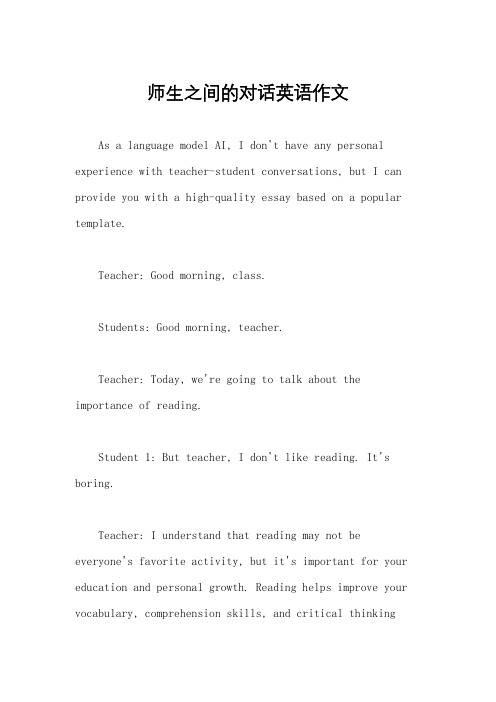
师生之间的对话英语作文As a language model AI, I don't have any personal experience with teacher-student conversations, but I can provide you with a high-quality essay based on a popular template.Teacher: Good morning, class.Students: Good morning, teacher.Teacher: Today, we're going to talk about the importance of reading.Student 1: But teacher, I don't like reading. It's boring.Teacher: I understand that reading may not be everyone's favorite activity, but it's important for your education and personal growth. Reading helps improve your vocabulary, comprehension skills, and critical thinkingabilities.Student 2: But I don't have time to read. I have too much homework.Teacher: I understand that you may have a lot of homework, but it's important to make time for reading. You can start by reading for 15-20 minutes a day. You can also try reading during your commute or before bed.Student 3: But I don't know what to read.Teacher: That's okay. There are many different types of books and genres to choose from. You can start by reading books that interest you, such as science fiction, mystery, or romance. You can also ask your friends or family for recommendations.Student 4: But I don't understand what I'm reading.Teacher: That's okay too. Reading can be challenging, but it's important to keep practicing. You can start byreading books that are at your reading level and gradually work your way up to more difficult books. You can also ask for help from your teacher or a tutor.Student 5: But I don't have any books at home.Teacher: That's okay. You can borrow books from your school or local library. You can also download e-books or audiobooks online.Student 6: But I don't like reading in English. It's too hard.Teacher: I understand that reading in a second language can be challenging, but it's important to keep practicing. Reading in English can help improve your language skills and prepare you for academic and professional settings. You can start by reading books that are at your reading level and gradually work your way up to more difficult books. You can also ask for help from your teacher or a tutor.Student 7: But I don't see the point of reading. I justwant to pass my exams.Teacher: I understand that passing exams is important, but it's also important to develop a love for learning and personal growth. Reading can help you discover new ideas, cultures, and perspectives. It can also help you develop empathy and understanding for others.Student 8: But I don't have any motivation to read.Teacher: That's okay. Developing a love for reading takes time and practice. You can start by setting small goals for yourself, such as reading for 15-20 minutes a day or finishing a book in a week. You can also try joining a book club or discussing books with your friends or family.In conclusion, reading is an important skill for education and personal growth. It may not be everyone's favorite activity, but it's important to make time for reading and keep practicing. With time and practice, you may discover a love for reading and all the benefits that come with it.。
开学见面的英语对话
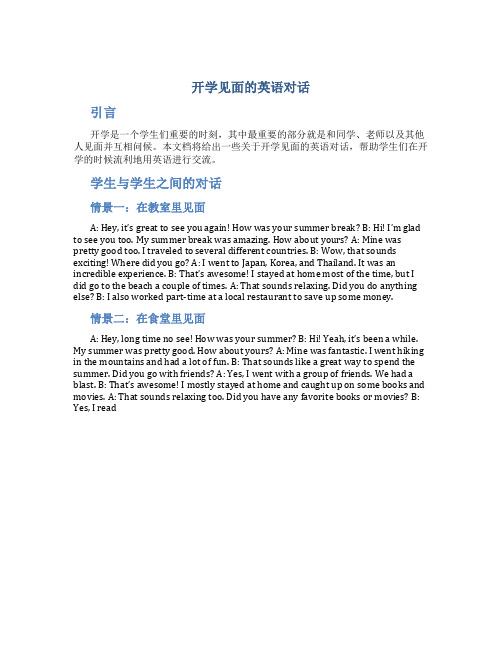
开学见面的英语对话引言开学是一个学生们重要的时刻,其中最重要的部分就是和同学、老师以及其他人见面并互相问候。
本文档将给出一些关于开学见面的英语对话,帮助学生们在开学的时候流利地用英语进行交流。
学生与学生之间的对话情景一:在教室里见面A: Hey, it’s great to see you again! How was your summer break? B: Hi! I’m glad to see you too. My summer break was amazing. How about yours? A: Mine was pretty good too. I traveled to several different countries. B: Wow, that sounds exciting! Where did you go? A: I went to Japan, Korea, and Thailand. It was an incredi ble experience. B: That’s awesome! I stayed at home most of the time, but I did go to the beach a couple of times. A: That sounds relaxing. Did you do anything else? B: I also worked part-time at a local restaurant to save up some money.情景二:在食堂里见面A: Hey, long time no see! How was your summer? B: Hi! Yeah, it’s been a while. My summer was pretty good. How about yours? A: Mine was fantastic. I went hiking in the mountains and had a lot of fun. B: That sounds like a great way to spend the summer. Did you go with friends? A: Yes, I went with a group of friends. We had a blast. B: That’s awesome! I mostly stayed at home and caught up on some books and movies. A: That sounds relaxing too. Did you have any favorite books or movies? B: Yes, I read。
小学英语教学中的对话教学
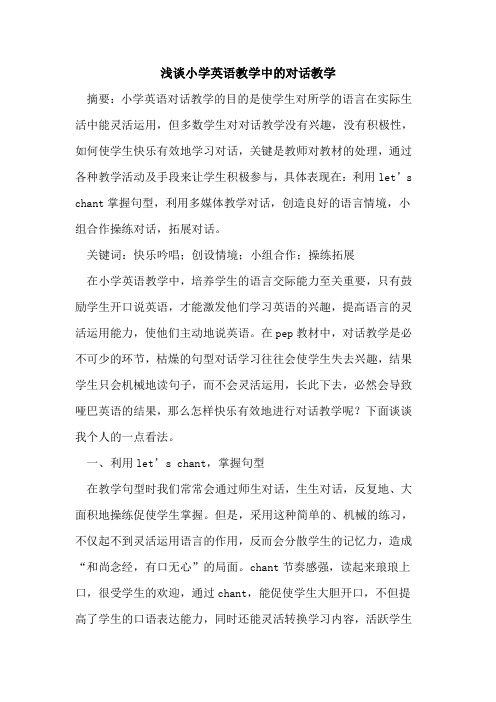
浅谈小学英语教学中的对话教学摘要:小学英语对话教学的目的是使学生对所学的语言在实际生活中能灵活运用,但多数学生对对话教学没有兴趣,没有积极性,如何使学生快乐有效地学习对话,关键是教师对教材的处理,通过各种教学活动及手段来让学生积极参与,具体表现在:利用let’s chant掌握句型,利用多媒体教学对话,创造良好的语言情境,小组合作操练对话,拓展对话。
关键词:快乐吟唱;创设情境;小组合作;操练拓展在小学英语教学中,培养学生的语言交际能力至关重要,只有鼓励学生开口说英语,才能激发他们学习英语的兴趣,提高语言的灵活运用能力,使他们主动地说英语。
在pep教材中,对话教学是必不可少的环节,枯燥的句型对话学习往往会使学生失去兴趣,结果学生只会机械地读句子,而不会灵活运用,长此下去,必然会导致哑巴英语的结果,那么怎样快乐有效地进行对话教学呢?下面谈谈我个人的一点看法。
一、利用let’s chant,掌握句型在教学句型时我们常常会通过师生对话,生生对话,反复地、大面积地操练促使学生掌握。
但是,采用这种简单的、机械的练习,不仅起不到灵活运用语言的作用,反而会分散学生的记忆力,造成“和尚念经,有口无心”的局面。
chant节奏感强,读起来琅琅上口,很受学生的欢迎,通过chant,能促使学生大胆开口,不但提高了学生的口语表达能力,同时还能灵活转换学习内容,活跃学生的思维。
如,在教学四年级英语unit6 b let’s learn 时,我自编了一个chant:what’s your father?he is a doctor.what’s your mother?she is a nurse.what’s your uncle?he is a driver.what’s your aunt?she is a farmer.what’s your brother?he is a baseball player.what’s your sister?she is a teacher.they love me so,i love them,too.该chant能灵活转换名称和名词,当学生随着节奏吟唱时,不仅感到快乐,而且轻松地掌握了单词和句型。
师生之间谈话英文作文
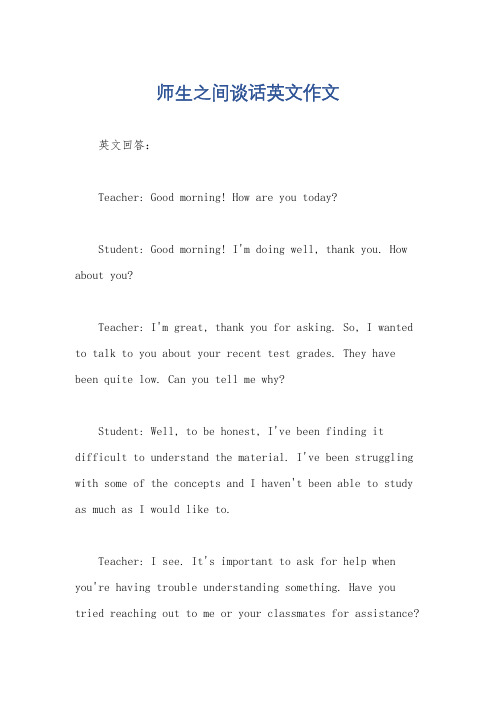
师生之间谈话英文作文英文回答:Teacher: Good morning! How are you today?Student: Good morning! I'm doing well, thank you. How about you?Teacher: I'm great, thank you for asking. So, I wanted to talk to you about your recent test grades. They have been quite low. Can you tell me why?Student: Well, to be honest, I've been finding it difficult to understand the material. I've been struggling with some of the concepts and I haven't been able to study as much as I would like to.Teacher: I see. It's important to ask for help whenyou're having trouble understanding something. Have you tried reaching out to me or your classmates for assistance?Student: Yes, I have asked a few classmates for help, but I still feel like I need more support. I think I need some extra practice or maybe some one-on-one tutoring.Teacher: That's a good idea. I can definitely provide you with some extra practice materials. Additionally, I can arrange for some tutoring sessions with you after school. Would that be helpful?Student: Yes, that would be great! Thank you so muchfor offering your help.中文回答:英文回答:Teacher: Good morning! How are you today?Student: 早上好!我今天很好,谢谢您。
变“一言堂”为“师生对话”——浅析英语课堂的提问策略

质疑能力 , 使他们善思会问 、 大胆质疑 、 于创新 , 敢 成为学习的 :
I
I
I
以下是我在一堂英语单元复习课上 的教学片断:
主人 。以我 现在的班级为例 , 现在的英语课上 , 他们能时常质 I “ 老师 , 责任心一词你拼错 了吧”老师 , “ 这句话中你用 了 l k I o o
・探 索 ・ 【 百家纵横 】
变“ 一言堂 " 师生对 话 ’ 为“ ’
— —
浅析 英语课 堂 的提 问策略 上 海 ・ 奕 孙
—
/
‘一 一 …一 —
—
一 — 一
传统的英语课堂 ,师生之间要么没有交流而成为教师 的 sb c ” uj t 这一问题恰到好处地提醒学生注意中英文思维与运 \ e? : “ 满堂灌” 一言堂”要么师生之间 的交流随意而毫无 目的 , 用 上 的差 异 。从 一定 程 度 上也 可 以 说 这 一提 问有 助 于 学 生认 : 或“ ,
J 考, 让其发现知识与问题 , 而获取知识与技 能。在以上的教 传统模式外 , 从 更应善于引导学生提问 , 让学生变被动学 习为主 I f 学片断中, 我通过这样一个 问题激起 了学生的发散性思维 , 并 动学习 , 主动地融人课堂学习中去 , 并逐渐培养学生 的质疑能 l
重 要 。 问 作 为课 堂 教 学 的最 重 要 手 段之 一 , 有 课 堂教 学 的 提 从 教 师 的课 堂 提 问有 时还 可 以是 一 连 串 的 ,这 一 连 串 的提 。
I 那天起 , 就产生了。 在教育多元化 , 教育观念 日新月异 、 教学手 问即可称做追问。 追问是指在教师提 问之后 , 学生提供的答案 』 I 段层出不穷的今天 , 课堂提问仍然是教学 的最重要手段之一 , 虽然正确, 但还不够深入, 或者不够清晰, 又或者不够规范, 在 『
关于小学生英语对话表演小学生英语口语对话精选全文
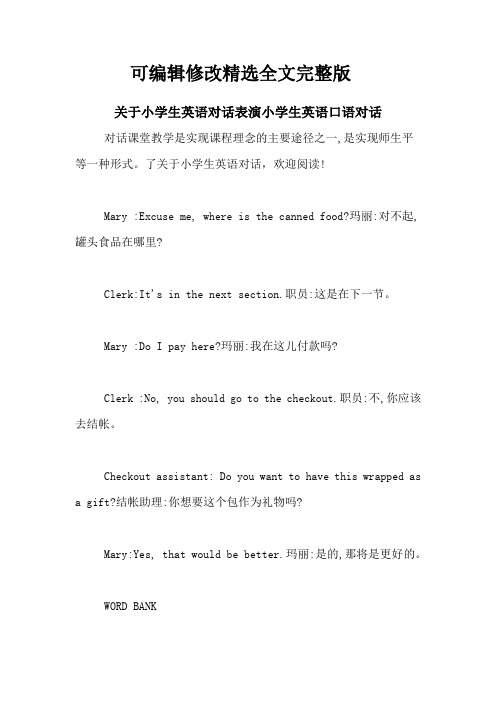
可编辑修改精选全文完整版关于小学生英语对话表演小学生英语口语对话对话课堂教学是实现课程理念的主要途径之一,是实现师生平等一种形式。
了关于小学生英语对话,欢迎阅读!Mary :Excuse me, where is the canned food?玛丽:对不起,罐头食品在哪里?Clerk:It's in the next section.职员:这是在下一节。
Mary :Do I pay here?玛丽:我在这儿付款吗?Clerk :No, you should go to the checkout.职员:不,你应该去结帐。
Checkout assistant: Do you want to have this wrapped as a gift?结帐助理:你想要这个包作为礼物吗?Mary:Yes, that would be better.玛丽:是的,那将是更好的。
WORD BANKcheckout n.结账处camed food罐头食品clerk/kla:k/n.店员wrap v.包,裹Tom: May I bother you a moment?汤姆:我可以打扰你一会儿吗?How can I get to People's Square?我 __到人民广场吗?Celina:It's far away from here. You'd better take a taxi.塞丽娜:它是远离这里。
你最好乘出租车去。
Tom :But I am afraid of taking a taxi alone.汤姆:但是我害怕独自打车。
Celina:Don't worry about the public safety in China.塞丽娜:不要担心在中国的公共安全。
It is pretty good.它是相当不错的。
WORD BANKbother v.打扰alone adv.独自public safety治安Jane:Look , today is December 18th. Christmas is ing.简:看,今天是12月18日。
关于教室里的对话英语作文
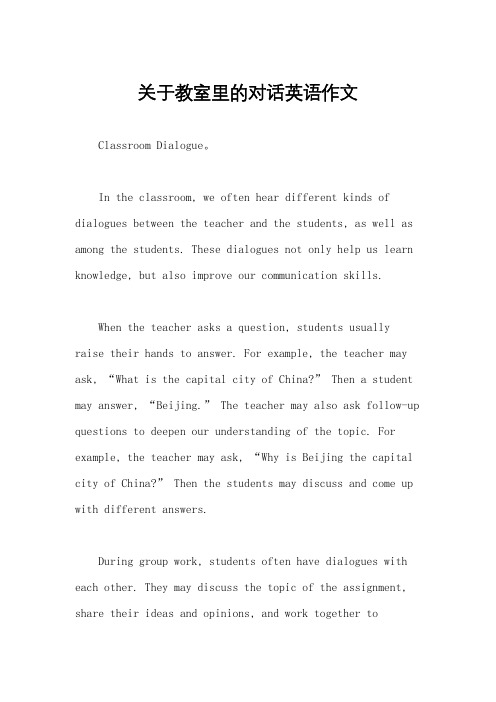
关于教室里的对话英语作文Classroom Dialogue。
In the classroom, we often hear different kinds of dialogues between the teacher and the students, as well as among the students. These dialogues not only help us learn knowledge, but also improve our communication skills.When the teacher asks a question, students usually raise their hands to answer. For example, the teacher may ask, “What is the capital city of China?” Then a student may answer, “Beijing.” The teacher may also ask follow-up questions to deepen our understanding of the topic. For example, the teacher may ask, “Why is Beijing the capital city of China?” Then the students may discuss and come up with different answers.During group work, students often have dialogues with each other. They may discuss the topic of the assignment, share their ideas and opinions, and work together tocomplete the task. For example, in a science project, students may discuss what materials they need, how to conduct experiments, and how to analyze the data. Through these dialogues, students can learn from each other and develop their teamwork skills.In addition, there may be some casual dialogues in the classroom. For example, when a student is absent, the teacher may ask the class, “Has anyone seen John today?” Then a student may answer, “I saw him in the library this morning.” These dialogues not only create a lively and friendly atmosphere in the classroom, but also help us know more about each other.In conclusion, dialogues in the classroom are essential for our learning and personal development. They help us acquire knowledge, improve our communication skills, and build relationships with our classmates and teachers. Therefore, we should actively participate in classroom dialogues and take advantage of them to enhance our learning experience.。
简单英语日常交流口语对话小学
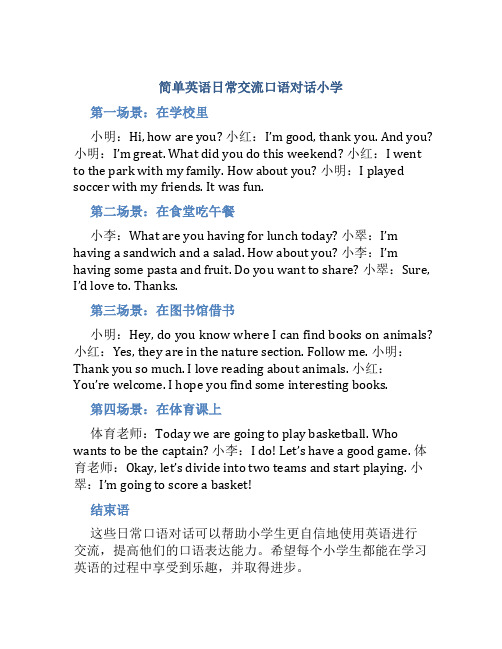
简单英语日常交流口语对话小学第一场景:在学校里小明:Hi, how are you? 小红:I’m good, thank you. And you? 小明:I’m great. What did you do this weekend? 小红:I went to the park with my family. How about you? 小明:I played soccer with my friends. It was fun.第二场景:在食堂吃午餐小李:What are you having for lunch today? 小翠:I’m having a sandwich and a salad. How about you? 小李:I’m having some pasta and fruit. Do you want to share? 小翠:Sure, I’d love to. Thanks.第三场景:在图书馆借书小明:Hey, do you know where I can find books on animals? 小红:Yes, they are in the nature section. Follow me. 小明:Thank you so much. I love reading about animals. 小红:You’re welcome. I hope you find some interesting books.第四场景:在体育课上体育老师:Today we are going to play basketball. Who wants to be the captain? 小李:I do! Let’s have a good game. 体育老师:Okay, let’s divide into two teams and start playing. 小翠:I’m going to score a basket!结束语这些日常口语对话可以帮助小学生更自信地使用英语进行交流,提高他们的口语表达能力。
小学对话课过程描写英文范文

小学对话课过程描写英文范文The classroom is buzzing with excitement as the students eagerly await the start of the dialogue class. This weekly session is a highlight for many, where they not only practice their English speaking skills but also learn valuable lessons about communication, confidence, and self-expression. As the teacher enters, a hush falls over the room, and all eyes are fixed on her.She begins by greeting the class warmly, her voice calm and reassuring. "Good morning, everyone. Today, we're going to explore the art of conversation." Immediately, hands shoot up, eager to share their experiences and ideas. The teacher skillfully navigates the sea of enthusiasm, calling on each student in turn.One by one, they share anecdotes about their attempts at conversing in English, some successful, others met with challenges. The teacher listens attentively, offering encouragement and constructive feedback. She reminds them that mistakes are a natural part of the learning process and that the key is to keep practicing with confidence.Next, the teacher introduces a role-playing activity, where studentsare paired up and given scenarios to act out. The room buzzes with excitement as they eagerly prepare for their performances. Some pairs take on the roles of friends planning a weekend outing, while others portray a customer and a shopkeeper engaging in a transaction.As each pair steps forward, their classmates watch with rapt attention, offering supportive applause and laughter at the humorous exchanges. The teacher gently guides them, offering suggestions for improvement and praising their efforts. She emphasizes the importance of body language, eye contact, and active listening –skills that are essential for effective communication.The class continues with various exercises and games designed to build fluency and confidence. In one activity, students are challenged to describe a picture using only the vocabulary they have learned, fostering creativity and resourcefulness. In another, they engage in impromptu conversations, practicing their ability to think on their feet and adapt to ever-changing situations.Throughout the session, the teacher creates an environment of trust and encouragement, allowing students to shed their inhibitions and express themselves freely. She celebrates their successes, no matter how small, and offers constructive criticism with kindness and empathy.As the class draws to a close, the students reflect on their experiences, sharing their breakthroughs and challenges. The teacher reminds them that learning a language is a journey, and that every step forward is worthy of celebration. She encourages them to continue practicing, both in and outside of the classroom, and to embrace the beauty of cross-cultural communication.The students leave the classroom brimming with newfound confidence and a deeper appreciation for the nuances of language. They carry with them not only improved English skills but also valuable life lessons about perseverance, empathy, and the power of human connection. The dialogue class has truly become a transformative experience, fostering not just linguistic proficiency but also personal growth and a broader understanding of the world around them.。
小学生对话英语老师作文

小学生对话英语老师作文As a primary school student, I always look forward to my English class. Our English teacher, Miss Wang, is a kind and patient teacher who always encourages us to speak English confidently. Today, I had a conversation with Miss Wang, and I would like to share it with you.Me: Good morning, Miss Wang!Miss Wang: Good morning, class. How are you today?Me: I'm fine, thank you. How about you?Miss Wang: I'm doing well, thank you. What did you learn in our last class?Me: We learned about the present continuous tense. It's used to talk about actions that are happening right now.Miss Wang: Very good! Can you give me an example of asentence in the present continuous tense?Me: Sure. "I am playing with my friends."Miss Wang: Excellent! Now, let's practice some more. Can you make a sentence using the present continuous tense?Me: "My mom is cooking dinner in the kitchen."Miss Wang: Great job! You're really getting the hang of it. Keep practicing, and you'll be speaking Englishfluently in no time.Me: Thank you, Miss Wang. I really enjoy learning English with you.Miss Wang: You're welcome, dear. I'm glad to hear that. Remember, practice makes perfect!This conversation with Miss Wang made me feel more confident about my English skills. I'm grateful to have such a wonderful teacher who always encourages us to do ourbest. I'm looking forward to our next English class and learning even more!。
给老师讲英语对话作文
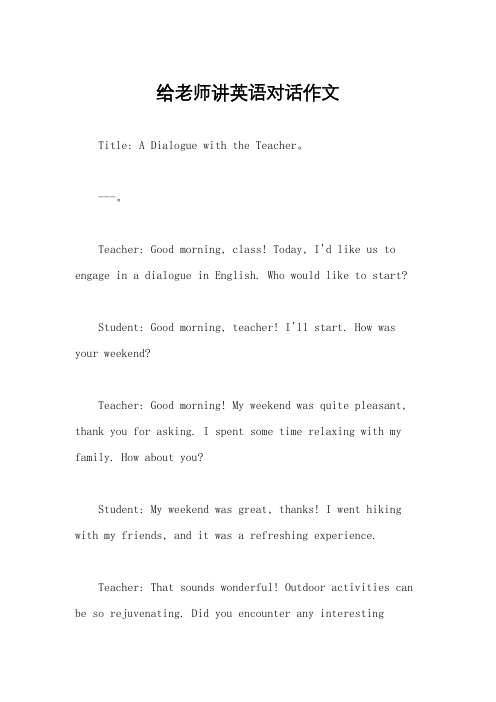
给老师讲英语对话作文Title: A Dialogue with the Teacher。
---。
Teacher: Good morning, class! Today, I'd like us to engage in a dialogue in English. Who would like to start?Student: Good morning, teacher! I'll start. How was your weekend?Teacher: Good morning! My weekend was quite pleasant, thank you for asking. I spent some time relaxing with my family. How about you?Student: My weekend was great, thanks! I went hiking with my friends, and it was a refreshing experience.Teacher: That sounds wonderful! Outdoor activities can be so rejuvenating. Did you encounter any interestingsights during your hike?Student: Yes, we did! We stumbled upon a beautiful waterfall hidden in the forest. It was breathtaking.Teacher: Wow, that sounds like a memorable experience. Nature has a way of captivating us with its beauty. Speaking of which, have any of you read any interesting books lately?Student: I recently finished reading "To Kill a Mockingbird" by Harper Lee. It was a captivating read, and it really made me reflect on important social issues.Teacher: "To Kill a Mockingbird" is indeed a classic that addresses timeless themes. What did you find most thought-provoking about the book?Student: I was particularly struck by the themes of racial injustice and moral courage portrayed in the novel. It made me realize the importance of standing up for what is right, even in the face of adversity.Teacher: It's heartening to hear that literature can have such a profound impact on your perspective. Analyzing themes like those can certainly broaden one's understanding of the world. Moving on to another topic, how do you feel about the upcoming exams?Student: I'm feeling a bit nervous, to be honest. I've been studying diligently, but I still worry about how I'll perform.Teacher: It's completely normal to feel anxious before exams, but remember to trust in your preparation and believe in your abilities. Do you have any specific areas you'd like to review before the exams?Student: I could use some extra practice with grammar and vocabulary. I tend to struggle with those aspects sometimes.Teacher: That's understandable. Perhaps we can schedule some review sessions to focus on those areas. Additionally,don't hesitate to ask for help if you encounter any difficulties while studying.Student: Thank you, teacher. I appreciate your support and guidance.Teacher: You're welcome, it's my pleasure to help. Remember, success is not just about the outcome of exams but also about the effort and dedication you put into your studies.Student: I'll keep that in mind. Thank you once again, teacher.Teacher: You're welcome. Now, let's continue our dialogue and explore more topics in English. Who else would like to participate?---。
- 1、下载文档前请自行甄别文档内容的完整性,平台不提供额外的编辑、内容补充、找答案等附加服务。
- 2、"仅部分预览"的文档,不可在线预览部分如存在完整性等问题,可反馈申请退款(可完整预览的文档不适用该条件!)。
- 3、如文档侵犯您的权益,请联系客服反馈,我们会尽快为您处理(人工客服工作时间:9:00-18:30)。
小学英语课堂中如何实施对话教学
柳树中心校:胡洁随着新课程教学的深入,小学英语教学中的一些问题渐渐暴露出来。
比如,有的学生跟不上英语教学的进度,学习英语非常吃力,一部分学生甚至丧失了进一步学习英语的兴趣和愿望;而小学英语教师也感到很困惑:教师教得这么累,学生学得这么苦,为什么效果却不尽如人意呢?针对上述种种现状,探求小学教师英语课堂教学效率,提高小学英语课堂教学的有效性,就显得非常迫切。
如何才能让英语课堂教学更加有效呢?
首先要明确小学英语教学的宗旨,即激发学生学习英语的兴趣,培养他们英语学习的积极态度,使他们建立初步的学习英语的自信心,培养一定的语感和良好的语音、语调基础,使他们形成初步用英语进行简单日常交流的能力,为进一步学习打下基础。
由此,我们知道学习英语只要达到能够交流的目的,课堂教学的实效性也就体现出来了。
因此,本文围绕英语课堂中的对话教学带来实效性课堂作出了一些探究。
英语是一门实践性很强的工具学科,运用英语进行交际是其实践性的主要表现。
在小学英语教学中开展对话教学就为学生提供了充分运用英语口语进行交往实践的机会,使学生从中加深理解,熟悉运用,牢固掌握,达到学以致用的目的。
“对话教学”是师生基于相互尊重、信任和平等的立场,通过对话式的相互作用来达到学生自主和自由发展的教学方式。
在“对话教学”中教师通过开放式的问题、情境活动,
要求学生联系自己的经验和想法或预习时收集的信息,进行多种形式的交流,从而开发学生的“原始资源”,实现师生交往过程中的资源生成。
教师不是单纯的提供知识,而是与学生共同进行有关学习主题、意见、思想、情感的交流和分享。
总之,“对话教学”既有利于学生主体的凸现,又有利于新型师生关系的培育。
这里结合平时的教学和精彩课堂片断来谈谈小学英语课堂中是如何实施对话教学以带来实效性课堂的。
一、构建新型的师生关系,创设和谐的英语课堂氛围,以提高课堂教学效率。
传统教学中,教师是知识的载体,高大威严的形象使得众多学生敬而远之,甚至于关系紧张,学生在压抑,被迫的情况下进行学习,学得无奈,课堂教学效果也是可想而知的。
对于需要进行大量语言实践的小学英语课堂更是雪上加霜。
英语新课标明确提出在英语教学中培养和发展积极的情感态度,语言学习上的成功体验与情感态度密不可分。
教学过程是师生平等对话的过程,只有平等,才能产生真正意义的对话,学生才会敞开心扉,大胆交流。
多年的英语教学实践告诉我们,教师在课堂中亲切的笑容能消除学生紧张的情绪,用诙谐幽默的话语代替严厉的批评使得学生很乐意接受,小学生注意力集中和自控能力毕竟是有限的,作为小学教师应给予更多的宽容和帮助,不要吝啬表扬的语言,鼓励和表扬将是学生遇到困难时前进的动力。
“Very good! (很好)/Great!(棒极了)/Excellent!(优秀的) /Well Done!(做得好) /Good boy!(棒小伙)/”在对学生进行肯定的
同时更是给予了学生自信心,活跃了学生的思维,是英语学习过程中提高效率必不可少的催化剂。
二、创造情景,加强直观效果,以提高学习效率。
语言离开了当时的情景和实际,将是无源之水,无本之末。
在对话教学中我注意了难点的讲解,更注意了情景的渲染,形象地描述,力求不使课堂气氛平淡。
教学过程中尽量用了实物或图片,辅助的手势、表情及必要的板书,来引起学生最大的兴趣。
l、直观教具,直观形象的运用增强教学效果
例如在My favourite food一课中,整节课围绕各种各样的食物展开,各种食物的英文表达法以及表达对不同食物的喜爱,成为这节课的重点。
还将各种食物利用拍照的方式搬上了屏幕,同学们一目了然,并且产生了极大的兴趣,因为屏幕上的食物实在是很逼真,最后同学们很轻松自然的说出了自己喜爱的食物,My favourite food is …,because it is….在这个过程中,其实是创造了一个模拟过中秋节的情景,模拟情景让学生们身临其境,这样一来,所学英语便与生活联系起来了,模拟情景转换成为了真实情景,课堂教学的实效性显而易见。
2、气氛的渲染,音乐的烘托推动教学过程
以听音为主的教学形式,不可避免地带来一个问题:录音放的多,学生亦感枯燥,注意力分散。
因此我们可以在录音上做了一些改进。
(1)不同人物的对话由教师用不同的声音来朗读,也就是我们所说的分角色朗读,这样同学们可以通过人物的语气在情感上产生的
共鸣会更多一些,情感一旦投入,就自然入境了,学起来就更快,掌握起来就更牢了。
(2)在适当的时候配上与主题相关的乐曲。
如在My birthday一课中,开课时我们就可以选用“生日快乐”的儿歌,这样就很快把学生和听课老师带入了过生日的情景中。
并且在收课时也用到了这首歌,首尾呼应,显得很完整。
三、开展形式多样的对话,提供更多的课堂实践机会,以促进学生高效输出语言。
新课标明确指出,小学英语教师要培养学生综合运用英语进行交际的能力,不仅要教学生学说英语,还要教他们学会运用英语,并能将所学到的英语知识举一反三。
英语课堂中丰富的对话是学生综合运用英语进行交际的主要场所。
众所周知,现行小学英语教材中问答式的对话占据了大部分的内容,利用free talk 问答的方式进行旧知的复习,利用教师和全体学生间的对话进行新授教学,利用大组与大组对话进行全体集体性的练习,再利用同桌间的对话进行个别语言实践,使得英语语言学习具有阶梯性,学生在充分对话练习的基础上再进行课堂对话,说得大胆流畅,再加以教师的热情洋溢的肯定,更使得学生体验到了由学习成功带来的喜悦和快乐,这种情感体验又能反作用于学生的英语学习,使学生有效学习英语的过程呈现一个良性循环。
1.师生对话;
虽然我们反对课堂中只存在单一的师生对话的形式,但是师生对话也是现行小学英语课堂教学中不可缺少的环节,课堂中真实的对话
离不开情景的创设,在生动的情景中师生的对话虽然没有中文的介入,学生也能很好地理解其中的内涵,教师作为一个引导者,以一种伙伴的态度和学生对话,这是一种全新的师生关系。
在教授lovely 这个单词时,可以有意识的用来表扬学生,这样,学生很容易理解,知道这是一个赞扬人的词,还会流利的用到学过的礼貌用语“Thank you”来作回应,当唱到这句话时便体会到了蝴蝶的可爱,唱起歌来就更带劲了。
2.大组对话;
如果说师生间的对话是新授教学中不可缺少的部分,那么各种形式的群体对话则是学生进行单独对话前强有力的纽带,将合作与竞争溶入群体对话,学生将更投入,课堂的英语对话将更有效。
句型的操练,对话式歌曲和说唱,学生在说唱“What’s your favourite colour? My favourite colour is…”这首歌曲时,很容易就将句型学会了。
在老师有秩序地指挥下进行句型的操练,效果明显。
3.同桌对话;
英语课堂教学的理想境界是学生能运用所学知识进行交流,实践,小组间的合作对话虽然也能创造出许多对话的机会,但往往小组对话只是个别活跃分子的天地,学生有了更广泛的选择对话对象的同时,使得班级部分后进生成了旁听生,观众。
同桌对话形式的固定使得每位同学都参与了生生对话,为了取得最佳组合奖,他们会互相帮助,充分对话,真正实现了英语课堂教学中的有效对话。
四、把学习的主动权完全交还给学生,建立合作式学习,以提高
有效性学习的能力。
对话教学借助创造性、生成性的过程,充分体现学生“自主探究”和“自主建构”的特征,使学生由被动受问者转变为主动发问者,真正成为学习的主人和自主探究者、发现者。
首先,把学习的主动权交还给学生是平等意识、人格尊重在教学中的体现,也是对话教学的前提。
只有把主动权让给学生,才能唤醒学生的主体意识,让学生根据自己的能力水平提出问题,并由学生讨论,阐述自己的见解,而教师只是适时地参与学生的交流讨论。
这样的教学,学生主动性得到充分调动,对话在教学中才能有效地得到贯彻和体现。
伴随着新课程的实践,我们深刻的认识到:对话双方是相互依存、相互作用的。
对话是沟通,其实质是互动。
对话教学中的教师与学生都是主动的参与者、平等的对话者。
对话的过程是师生、生生间积极互动、共同发展的过程,对话的结果是师生认知、思想情感的渐进与提升。
在对话过程中,我们教师既要重视对话的设计,更要关注学生的主动言说,善于倾听,积极回应,指导沟通,引发交流,使对话及其过程成为教学的重要内容和目的,真正实现“对话教学”,真正实现课堂教学的有效性,从而生成精彩的英语课堂。
